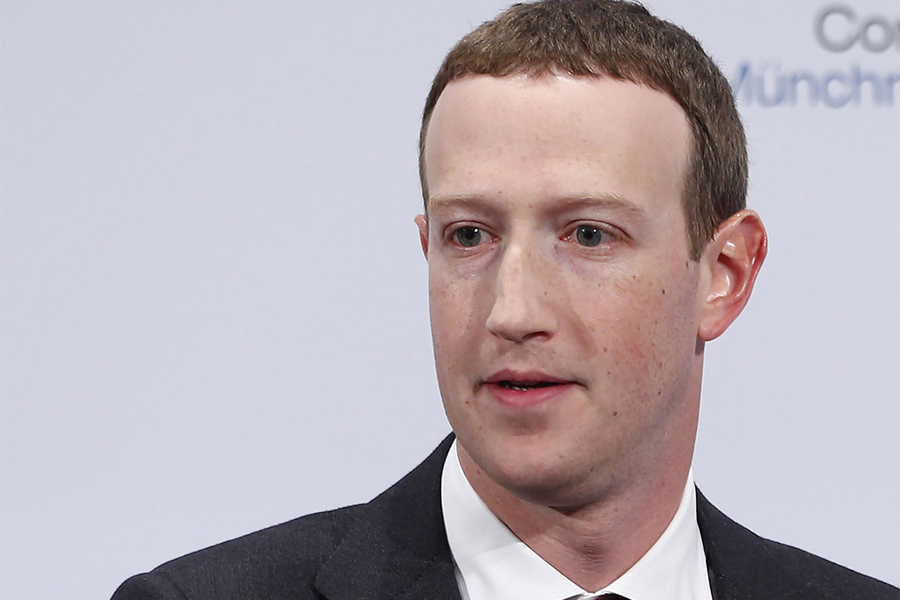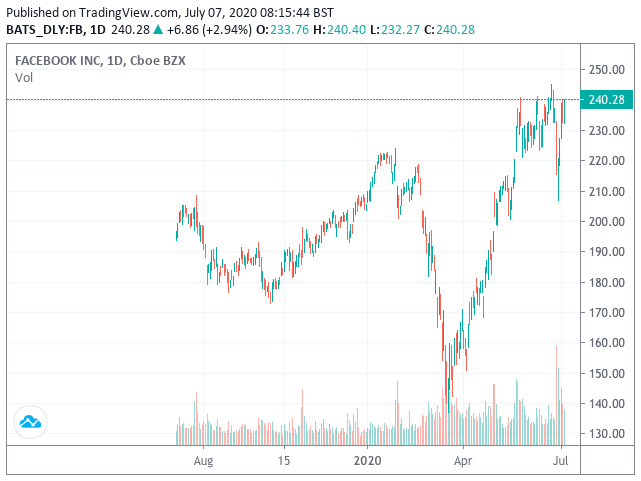
Tuesday, July 07, 2020
Can Facebook's share price recover from ad boycott?
تم إعداد هذا المنشور من قبل سنشري للاستشارات


Facebook’s [FB] share price fell last week as companies continued to pull advertising from the platform in response to its handling of hate speech. Diageo [DGE] and Starbucks [SBUX] are the latest companies to join the boycott, adding their weight to Ben & Jerry’s, Coca-Cola [KO] and Unilever [UNA] in something of a PR nightmare for the social media platform.
As part of the #StopHateforProfit campaign, these big-name brands want Facebook to do more to crack down on hate speech across its platforms. Drinks company Diageo summarised their position in a terse press statement:
“Diageo strives to promote inclusion and diversity, including through our marketing campaigns. From 1 July we will pause all paid advertising globally on major social media platforms. We will continue to discuss with media partners how they will deal with unacceptable content.”
Levi's [LEVI] was more direct in a tweet dated 27 June: "Facebook must take actions to stop misinformation and hate speech on its platforms. It is an unacceptable affront to our values."
So, how will this ad boycott harm Facebook's share price and reputation in the long-term? How quickly will the brands return to what is one of the biggest advertising platforms on the planet?


How the boycott affected Facebook's share price
The campaign saw Facebook's share price drop from $242.42 on 23 June to circa $216 on 26 June. The share price then recovered somewhat, closing at $233.42 last week (through 2 July’s close).
Online advertising is a key revenue generator for Facebook. The company makes an impressive 98% of its money selling ad space across its platforms. That said, and despite the headlines, big-name brands only represent a fraction of Facebook’s advertising revenue.


According to Rohit Kulkarni, executive director at MKM Partners, Facebook is looking at less than a 5% hit, as the vast majority of the company’s advertising revenue comes from small businesses:
“[Facebook] has more than 160 million registered businesses globally and 8 million paying advertisers,” Kulkarni said in a note to investors. The ad boycott shouldn’t impact Facebook’s bottom line too much, then, but questions regarding the company’s values and the impact this action might have on public perception are set to be more detrimental.
How has Facebook responded?
In response, Facebook CEO Mark Zuckerberg has agreed to meet with organisers of the protest, and has also allowed for an audit of Facebook's efforts to control hate speech on its platforms. There are signs Zuckerberg might be hoping to simply ride out the PR storm, however. MarketWatch cites a transcript of an internal Facebook town hall meeting seen by tech site the Information when it reports Zuckerberg as saying the following at an internal meeting:
“We’re not gonna change our policies or approach on anything because of a threat to a small percent of our revenue, or to any percent of our revenue,” he allegedly said.


Zuckerberg went on to imply that Facebook wouldn't be bowing to external pressure, in order to avoid creating a precedent.
So, time to buy Facebook?
Wall Street doesn't seem to think the scandal will detrimentally affect Facebook in the long-term. For the current quarter, earnings expectations are $1.36 a share, up from $0.91 seen in the same quarter last year. Revenues are expected to come in at $17.2 billion, up from the $16.89 billion seen in the same quarter last year.
Of the 44 analysts tracking the stock on Yahoo Finance, 17 rate it a Strong Buy and 24 a Buy. An average $246.70 price target would see an almost 6% upside on Facebook’s current share price (through 2 July’s close).
Ultimately the boycott doesn't look likely to impact Facebook's share price in the mid- to long-term. For investors, the question is likely to be whether or not the aftermath of this campaign leaves them feeling comfortable to invest in Facebook.


Source: This content has been produced by Opto trading intelligence for Century Financial and was originally published on cmcmarkets.com/en-gb/opto
Disclaimer: Past performance is not a reliable indicator of future results.
The material (whether or not it states any opinions) is for general information purposes only and does not take into account your personal circumstances or objectives. Nothing in this material is (or should be considered to be) financial, investment or other advice on which reliance should be placed. No opinion given in the material constitutes a recommendation by Century Financial or the author that any particular investment, security, transaction or investment strategy is suitable for any specific person.
Century Financial does not endorse or offer opinion on the trading strategies used by the author. Their trading strategies do not guarantee any return and Century Financial shall not be held responsible for any loss that you may incur, either directly or indirectly, arising from any investment based on any information contained herein.
















